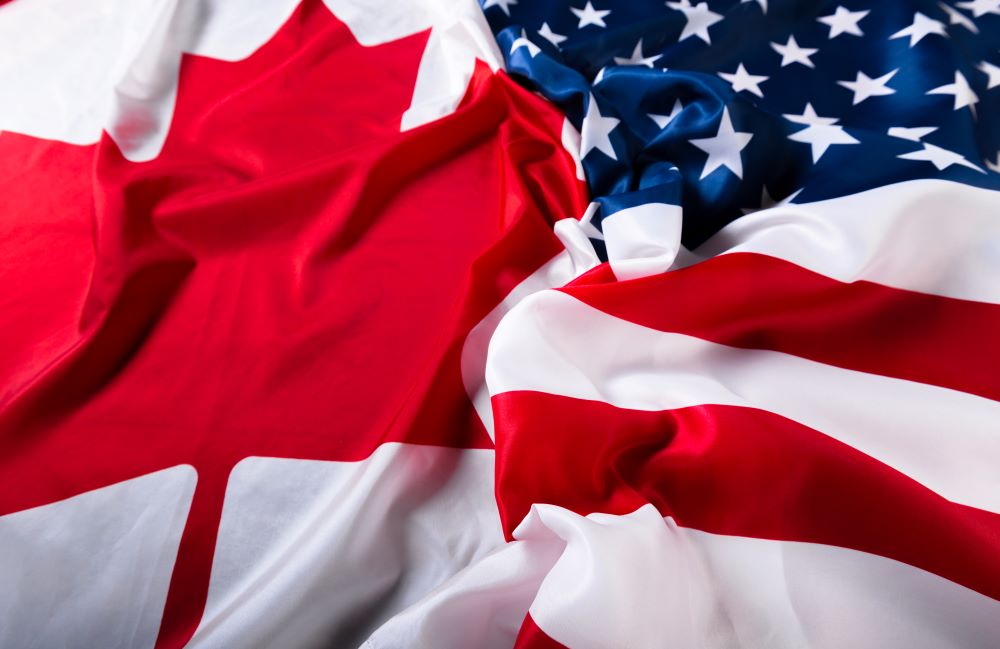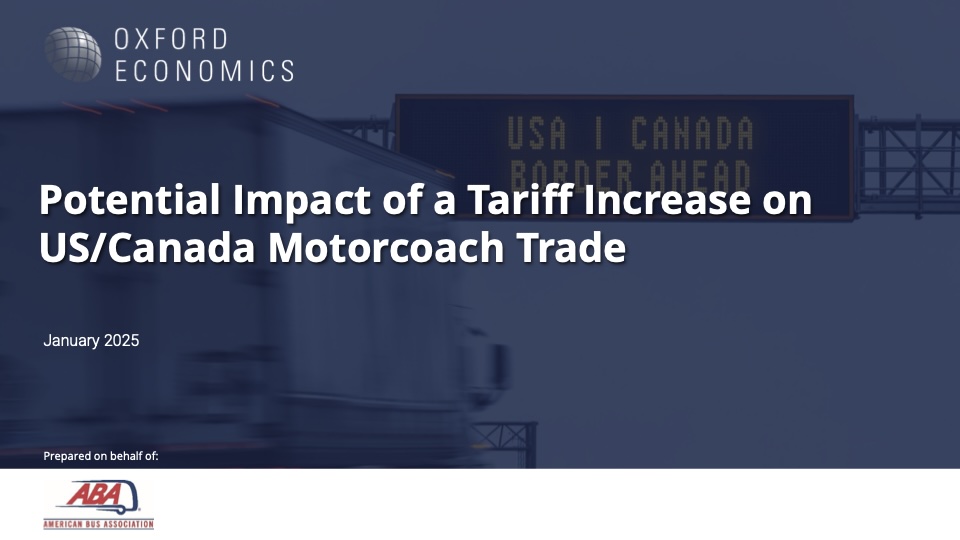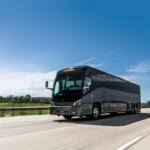New Study Highlights Economic Risks of Proposed Motorcoach Tariffs and the Industry’s Vital Role in the Economy
Tariffs on motorcoaches and parts threaten the U.S. economy and essential transportation for millions.

The American Bus Association (ABA), the leading voice in North America’s motorcoach, charter bus, group travel, and tourism industries, in partnership with the American Bus Association Foundation (ABAF), has released a new study conducted by Oxford Economics that underscores the vital economic contributions of the motorcoach and charter bus industry and its North American supply chain.
The imposition of tariffs on motorcoaches and their components would have significant negative consequences for the U.S. economy and the millions of Americans who depend on motorcoach travel for essential transportation services across the country. This challenge is further intensified by the ongoing recovery of the motorcoach industry from the COVID-19 pandemic, which nearly halved the number of operators, with 1,800 registered motorcoach operators on the roads today.
“Motorcoaches are a critical part of the transportation ecosystem in the U.S., serving a diverse range of sectors, from fixed route services to private charter bus services and travel and tourism activities,” said Fred Ferguson, President and CEO of the American Bus Association. “Placing tariffs on these vehicles or their components would disrupt this vital segment of the economy that drives the $100 billion motorcoach and group travel industry by raising costs for operators and increasing prices and limiting service for consumers.”
Motorcoach original equipment manufacturers (OEMs) are primarily based in Canada and Europe. While many motorcoaches are imported, critical components such as engines, transmissions, and electrical systems are produced in the U.S. Imposing tariffs on imported vehicles would disrupt the supply chain, increasing costs and negatively impacting domestic manufacturers.
Throughout much of the 20th century, the U.S. was a global leader in motorcoach manufacturing. However, during the 1980s, a combination of shifting market conditions, new environmental regulations, and rising operational costs led many U.S. OEMs to exit the market, shifting all production overseas.
Oxford Economics Projections: The Cost of Tariffs
An analysis by Oxford Economics highlights the consequences of a 25% tariff on Canadian motorcoach imports:
- Motorcoach Capacity Decrease: Reduced supply, leading to constrained operations across the U.S.
- Economic Losses: A projected loss of $3.1 billion in business sales in 2026 and the elimination of 14,460 U.S. jobs.
- Tax Revenue Impact: The tariffs would cause a loss of $193.4 million in Federal tax revenues—resulting in a net loss of $34.8 million to the U.S. Treasury.
Economic Contribution of the Industry
In 2023, the U.S. motorcoach and group travel industry:
- Generated $107 billion in economic impact annually.
- 541,400 jobs supported by the motorcoach industry, with 327,000 direct jobs at motorcoach operations and other directly supported industries, including restaurants, stores, and hotels used by motorcoach passengers.
- Contributed $28.2 billion in wages and $6.6 billion in federal taxes in 2023.
Consumer Impact
Higher costs would inevitably be passed on to consumers, affecting key demographics who rely on motorcoach transportation:
- Commuters: Dependable and affordable daily transportation would become costlier.
- Students and Schools: Charter bus services for sports events, field trips, and college travel would see price increases.
- Senior Citizens: Group travel options for retirees and senior organizations could become inaccessible.
- Tourists: Families and travelers relying on buses for regional and long-distance trips would face higher prices, limiting travel opportunities.
Innovation Impact
The increased cost of new motorcoaches would also undermine technological advancements. Operators would delay purchasing new vehicles, relying instead on aging fleets. This would slow the adoption of improvements in:
- Fuel Efficiency: Limiting gains in reducing emissions and operating costs.
- Alternative Propulsion Systems: Such as electric and hybrid technologies.
- Passenger Comfort and Safety: New safety features and modern amenities would take longer to enter the market.
“The American Bus Association urges policymakers to carefully weigh the far-reaching economic and social consequences of tariffs placed on motorcoaches,” said Callie Hoyt, Senior Vice President of Public Affairs and Government Relations for the American Bus Association. “Bus transportation is a critical link for millions of Americans, and applying tariffs could directly threaten the availability and affordability of motorcoaches by driving up costs and disrupting supply chains. This would not only harm U.S. operators who rely on access to safe, reliable vehicles but also the commuters, travelers, and events who depend on motorcoach services every day. While we understand the need to improve global competitiveness, increasing motorcoach costs risks making buses harder to acquire, maintain, and operate while undermining domestic suppliers producing key components like engines, transmissions and electrical systems.”




